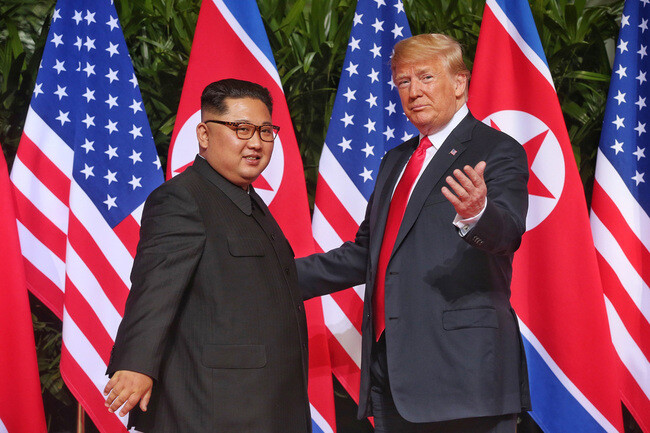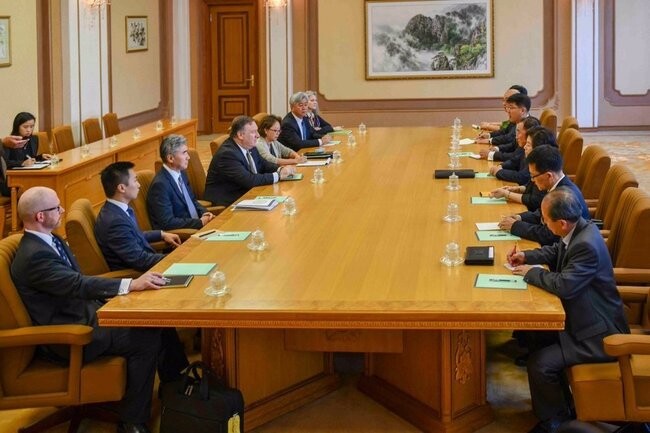hankyoreh
Links to other country sites 다른 나라 사이트 링크
[News analysis] One month after summit, fierce tug-of-war over agenda between N. Korea and US

As of July 12, one month has passed since US President Donald Trump and North Korean leader Kim Jong-un held their historic meeting in Singapore, the first ever summit between the two countries. Following US Secretary of State Mike Pompeo’s third visit to North Korea on July 6 and 7, the “battle of nerves” between the two sides – a phenomenon often seen at the beginning of negotiations -- has intensified as they began to haggle over what they’re willing to trade.
One month after the summit, progress toward the four points to which North Korea and the US agreed in their joint statement – namely, establishing new relations, building a peace regime on the Korean Peninsula, achieving complete denuclearization of the peninsula, and repatriating the remains of US soldiers – has been slower than the initial excitement would have suggested.
First, in regard to the first point about the complete denuclearization of the Korean Peninsula, which was a key part of the agreement, North Korea looks as if it only wants to include its “future nukes” on the agenda. The North’s promise to shut down an ICBM engine testing site, along with its demolition of the nuclear test site at Punggye Village shortly before the summit, represents its future nuclear capability. The compromise reached on the engine testing site shutdown during Pompeo’s third trip to the North had to do with holding working-level talks.
During Pompeo’s third trip, he appears to have focused on the issue of North Korea’s disclosure and verification of the nuclear weapons it currently possesses (its “past nukes”) and all of its nuclear and missile facilities (its “current nukes”). The North countered by characterizing this as a “one-sided and gangster-like” demand (in a July 7 statement by the spokesperson of the Foreign Ministry). Nor was the US able to produce a general timetable for denuclearization, which had been its original goal.
The fierce tug-of-war over the agenda between North Korea, which is focusing on “future nukes,” and the US, which wants to put all nuclear weapons – past, present and future – on the table, is unlikely to end without a sweeping bargain that can break the deadlock. The problem is that the North is reluctant to throw away its “lifeline” as long as it is uncertain what reward it will receive from the US.
Reversibility of military exercise suspensions, irreversibility of complete nuclear shutdown
Second, the agreement to build a lasting peace regime on the Korean Peninsula depends on US compensation for North Korea’s resolution to denuclearize. Shortly after the summit, the US preemptively announced that it was halting joint military exercises with South Korea in the interest of building trust. North Korea regards this message as reversible and said it is not worth as much as its “irreversible” destruction of the nuclear test site at Punggye Village.
The North argues that the US needs to sweeten the pot to make the deal fair. But the US counters by insisting that it took a major step that could weaken the foundation of its alliance with the South and that the North ought to therefore take further measures toward denuclearization.
The two sides also have conflicting opinions about declaring the end of the Korean War, which would be an initial and symbolic step down the path of building a peace regime. North Korea argues that the US is dragging its feet on something it has already agreed to do. The US seems to regard the declaration as premature because it could provoke calls for the dissolution of the UN Command and the removal of US troops from the Korean Peninsula. The US is also reluctant to make the declaration without additional concessions from the North.
Third, the US and North Korea had agreed to hold working-level talks about repatriating the remains of US service members at Panmunjeom on July 12, but the North Korean contingent never appeared. Though Trump has said that the remains would be repatriated soon, things do not seem to be going smoothly. Since this is of considerable interest to Trump and a sensitive issue for the American public, there could be trouble if this falls through.
Finally, the two sides have been unable to embark on resetting their relations. There has been no mention of setting up a liaison office, nor have they apparently managed to reach an agreement on rudimentary events for cultural exchange, such as a Taekwondo demonstration.

All things considered, trust between Trump and Kim seems to remain solid
But the trust between Trump and Kim, which is the “only” momentum that has driven the process forward thus far, appears to remain solid. In the July 7 statement by the spokesperson of North Korea’s Foreign Ministry, the North said that it still puts its trust in Trump. And on July 9, Trump expressed his confidence that Kim Jong-un would respect the contract they had signed and, even more importantly, their handshake.
Experts say that South Korea’s role has become even more important. “South Korea needs to move in the direction of persuading Trump to declare the end of the Korean War, which could be an opportunity for North Korea to take the first steps [toward denuclearization],” said Kim Joon-hyung, professor at Handong Global University.
“The South Korean government needs to adopt a proactive stance and serve as a mediator not only in inter-Korean relations but also in denuclearization and security assurances,” said Cho Sung-ryul, senior research fellow for the Institute for National Security Strategy.
By Yi Yong-in, Washington correspondent, and Noh Ji-won, staff reporter
Please direct comments or questions to [english@hani.co.kr]

Editorial・opinion
![[Column] Life on our Trisolaris [Column] Life on our Trisolaris](https://flexible.img.hani.co.kr/flexible/normal/500/300/imgdb/original/2024/0505/4817148682278544.jpg) [Column] Life on our Trisolaris
[Column] Life on our Trisolaris![[Editorial] Penalties for airing allegations against Korea’s first lady endanger free press [Editorial] Penalties for airing allegations against Korea’s first lady endanger free press](https://flexible.img.hani.co.kr/flexible/normal/500/300/imgdb/original/2024/0502/1817146398095106.jpg) [Editorial] Penalties for airing allegations against Korea’s first lady endanger free press
[Editorial] Penalties for airing allegations against Korea’s first lady endanger free press- [Editorial] Yoon must halt procurement of SM-3 interceptor missiles
- [Guest essay] Maybe Korea’s rapid population decline is an opportunity, not a crisis
- [Column] Can Yoon steer diplomacy with Russia, China back on track?
- [Column] Season 2 of special prosecutor probe may be coming to Korea soon
- [Column] Park Geun-hye déjà vu in Yoon Suk-yeol
- [Editorial] New weight of N. Korea’s nuclear threats makes dialogue all the more urgent
- [Guest essay] The real reason Korea’s new right wants to dub Rhee a founding father
- [Column] ‘Choson’: Is it time we start referring to N. Korea in its own terms?
Most viewed articles
- 1New sex-ed guidelines forbid teaching about homosexuality
- 260% of young Koreans see no need to have kids after marriage
- 3Presidential office warns of veto in response to opposition passing special counsel probe act
- 4[Column] Life on our Trisolaris
- 5Months and months of overdue wages are pushing migrant workers in Korea into debt
- 6OECD upgrades Korea’s growth forecast from 2.2% to 2.6%
- 7S. Korea discusses participation in defense development with AUKUS alliance
- 8[Editorial] Penalties for airing allegations against Korea’s first lady endanger free press
- 9Opposition calling for thorough investigation into Pres. Park’s unelected power broker
- 10Ruling and opposition parties agree to special prosecutor for Pres. Park/Choi Sun-sil scandal